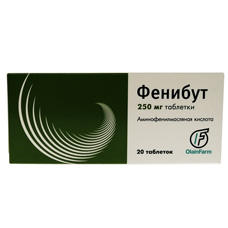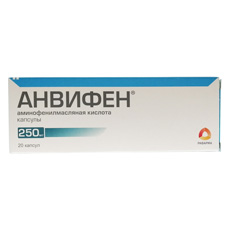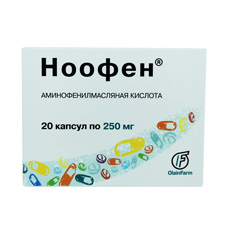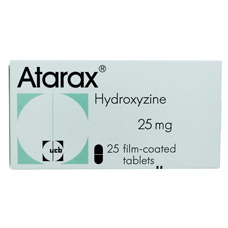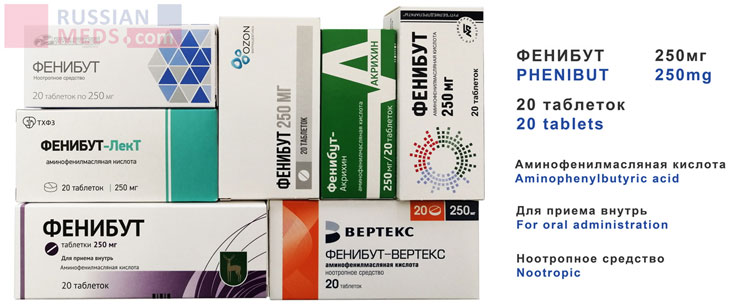
Phenibut
Phenibut eliminates disturbances in the work of the autonomic nervous system, asthenic syndrome, irritability and anxiety, stopes panic attacks. Phenibut does not act depressingly on the nervous system, so the patient does not experience drowsiness and apathy.Phenibut is the most popular anxiolytic in Russia, a dozen large manufacturers produce it at their enterprises under the strict control of the Russian authorities. Standard package of Phenibut contains 20 tablets of 250 mg.

Active substance:
Aminophenylbutyric acidPharmachologic effect:
Nootropic, anxiolyticPharmacodynamics:
Phenibut facilitates GABA-mediated transmission of nerve impulses to the central nervous system (direct effect on GABA receptors), also has tranquilizing, psychostimulant, antiplatelet and antioxidant effects.
It improves the functional state of the brain due to the normalization of tissue metabolism and the effect on cerebral circulation (increases the volumetric and linear velocity of cerebral blood flow, reduces the tone of cerebral vessels, improves microcirculation, and has an antiaggregant effect). It helps reduce or disappear feelings of anxiety, tension, anxiety and fear, normalizes sleep, has some anticonvulsant effect.
Phenibut does not affect cholinergic and adrenergic receptors, lengthens the latent period and shortens the duration and severity of nystagmus.
Phenibut reduces the manifestations of asthenia and vasovegetative symptoms (including headache, feeling of heaviness in the head, sleep disturbances, irritability, emotional lability), increases mental performance.
It improves psychological indicators (attention, memory, speed and accuracy of sensory-motor reactions).
With a course intake, it increases physical and mental performance, improves memory, normalizes sleep; improves the condition of patients with motor and speech disorders. Patients with asthenia feel better from the first days of therapy; it increases interest and initiative (activity motivation) without sedation and excitation. When used after severe head injury, it increases the number of mitochondria in the perifocal areas and improves the course of bioenergetic processes in the brain.
With neurogenic lesions of the heart and stomach, it normalizes the processes of lipid peroxidation. In the elderly, it does not cause congestion and excessive lethargy, a relaxing aftereffect is most often absent. Improves microcirculation in the tissues of the eye, reduces the inhibitory effect of ethanol on the central nervous system. Phenibut is low toxic.
Pharmacokinetics:
Absorption of the drug is high, it penetrates well into all tissues of the body and through the BBB (about 0.1% of the administered dose of the drug penetrates into the brain tissue, and in young and old people to a much greater extent). It is evenly distributed in the liver and kidneys. Aminophenylbutyric acid is metabolized in the liver - 80-95%, metabolites are pharmacologically inactive. It does not accumulate. After 3 hours, it begins to be excreted by the kidneys, while the concentration in the brain tissue does not decrease and it is found in the brain for another 6 hours. About 5% is excreted by the kidneys unchanged, partially with bile.
Indications:
Asthenic and anxiety-neurotic states, anxiety, fear, obsessive-compulsive disorder, psychopathy.
Stuttering and tics in children, enuresis.
Urinary retention due to myelodysplasia.
Insomnia and nightmares in the elderly.
Prevention of anxiety conditions that occur before surgical interventions and painful diagnostic studies (premedication).
Meniere's disease, dizziness associated with dysfunctions of the vestibular analyzer of various origins (including with otogenic labyrinthitis, vascular and traumatic disorders); prevention of motion sickness in kinetosis.
Primary open-angle glaucoma (as part of combination therapy).
As an adjuvant therapy in the treatment of alcoholism (for the relief of psychopathological and somatovegetative disorders in withdrawal symptoms).
Treatment of predelirious and delirious conditions in alcoholism (in combination with conventional detoxification agents).
Contraindications:
Hypersensitivity to Phenibut.Pregnancy and breast-feeding:
Use with caution during pregnancy and breast-feeding.
Side effects:
From the side of the CNS: increased irritability, agitation, anxiety, dizziness, headache, drowsiness.
From the digestive system: nausea (at the first dose).
Allergic reactions: skin rash, itching.
Interaction:
Phenibut extends and enhances the action of hypnotics, narcotic analgesics, antiepileptic, antipsychotic and antiparkinsonian drugs.
Dosing and Administration:
Phenibut is taken after eating, without chewing, drinking a small amount of water.
The dose, frequency of administration and duration of treatment depend on the indications, the age of the patient, and tolerability.
Asthenic and anxiety-neurotic conditions in adults and the elderly:
Adults - 250-500 mg 3 times a day. Max. single doses: for adults - 750 mg, for elderly and senile patients (over 60 years old) - 500 mg. If necessary, the daily dose is increased to 2500 mg. The course of treatment is 4-6 weeks.
Stuttering, tics and enuresis in children:
Children from 3 to 8 years old - 125 mg (1/2 tab.) 3 times a day; from 8 to 14 years - 250 mg (1 tab.) 3 times a day; over 14 years of age - take the doses recommended for adults. The course of treatment is 2-6 weeks.
Insomnia and nighttime anxiety in the elderly (60 years and older): 250-500 mg 3 times a day.
Elimination of dizziness in case of dysfunction of the vestibular analyzer of infectious genesis (otogenic labyrinthitis) and Meniere's disease: During an exacerbation, the dose is 750 mg (3 tablets) 3 times a day for 5-7 days, with a decrease in the severity of vestibular disorders - 250-500 mg (1-2 tab.) 3 times a day for 5-7 days and then - 250 mg 1 time per day for another 5 days. With a relatively mild course of the disease - 250 mg 2 times a day for 5-7 days, then - 250 mg 1 time per day for 7-10 days.
Elimination of dizziness in dysfunctions of the vestibular analyzer of vascular and traumatic origin: 250 mg 3 times a day for 12 days.
Prevention of motion sickness in kinetosis: 250-500 mg once 1 hour before the expected start of the journey or when the first symptoms of motion sickness appear. The anti-swaying effect of the drug increases with increasing dose. With the onset of pronounced manifestations of motion sickness (including severe vomiting), the administration of the drug inside is ineffective.
As part of complex therapy for alcohol withdrawal syndrome in order to relieve psychopathological and somatovegetative disorders: In the first days of treatment, 250-500 mg are prescribed 3 times during the day and 750 mg at night, with a gradual decrease in the daily dose to the usual for adults. Do not take a double dose to replace the missed dose.
In patients with renal and (or) hepatic insufficiency with prolonged use, it is necessary to monitor the indicators of kidney and (or) liver function. With impaired liver function, high doses of the drug may contribute to the development of hepatotoxicity. In such a case, patients are prescribed smaller doses.
Special instructions:
Use with caution in erosive and ulcerative lesions of the gastrointestinal tract, liver failure.
With prolonged use, it is necessary to monitor liver function and peripheral blood picture.
It is ineffective for severe symptoms of motion sickness (including indomitable vomiting, dizziness).
During the period of treatment, it is necessary to refrain from potentially hazardous activities that require increased attention and a high speed of psychomotor reactions.
Phenibut
in Cyrillic : Фенибут
SUBSTANCE
Aminophenylbutyric acid
DOSAGE FORM
tablets
In Stock
available pack options :
| 250mg x 20 tablets | $16.40 |


